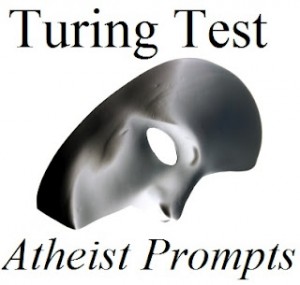This is the twelfth entry in the Atheism round of the 2012 Ideological Turing Test for Religion. In this round, the honest answers of atheists are mixed in with Christians’ best efforts to talk like atheists. It’s your job to see if you can spot the difference. The voting link appears at the end of the entry, and you can look at all entries in this round here.
When (if ever) have you deferred to your philosophical or theological system over your intuitions?
This is a weird question for me, since I don’t feel any particular loyalty to my philosophical system. I believe it because I think it’s true, not because it has some grander or deeper meaning, and not because I expect it to reveal some truth I don’t already know.
That being said, the consequences of one’s basic belief system are not always intuitively clear- nobody makes an intuitive leap from Euclid’s postulates to the fact that the sum of the exterior angles of any polygon equals 360. But applying the basic postulates in a rigorous and epistemologically correct way can gain you this new knowledge.
So I defer to my philosophical system when my basic beliefs necessarily lead to a conclusion that is not intuitively obvious to me. My confidence in this non-intuitive conclusion is identically equal to my confidence in the underlying assumptions (generally pretty high) and my confidence in my correct application of reason to these assumptions (generally lower than my confidence in the assumptions themselves).
Are there people whose opinions on morality you trust more than your own? How do you recognize them? How is trusting them different than trusting someone’s opinion on physics?
Strictly speaking, no, I don’t trust anyone else’s idea of morality more than my own.
If I was to find someone or something that, when we disagreed, was continually proved correct, I would learn to trust it. This is the case with me and science. There was a time in high school when I thought Relativity was ridiculous, and didn’t make any sense at all. I still think it’s ridiculous and doesn’t make any sense at all, but now I believe it. I wasn’t converted on the basis of evidence, but rather on the expertise of the overwhelming majority of people who’ve spent their life studying the subject.
The problem with applying this heuristic to morality is twofold. First, I don’t think anybody is an “expert” on morality, in the same sense that physicists are experts in physics. Second, the way I ultimately determine the truth of a moral claim is by comparing it to my own experience and beliefs. There are tons of people claiming to be moral experts, and the way I differentiate them is by whether or not I agree with them. It seems like even if I tend to agree with one of them, I’m the one doing the final judging.
So if there was someone I had come to trust on moral matters (and there are such people), their opinion would heavily inform my own. But ultimately, I’m the one judging for myself whether or not I agree with them; that’s how I decided they were an expert in the first place. Their moral opinion can’t override my own, because my own moral opinions are the basis on which I consider them to be an expert. This would be like saying you believe in science over evidence- science draws its authority from evidence, so it can’t ever overrule the evidence itself.
Can you name any works of art (interpreted pretty broadly: books, music, plays, poetry, mathematical proofs, etc) which really capture the way you see life/fill you with a sense of awe and wonder? You can give a short explanation or just list a few pieces.
I have a closeted romantic hiding somewhere inside me who loves music and books and poetry; I don’t see [him/her] much. I am occasionally affected by an artistic experience or object, but not in a consistent way. Most of the time when I am, it’s a song that gets me pumped up – almost like a tribal war-chant kind of thing.
I will say that I’m a sucker for the underdog we-vs-them story. Anything where an individual or small group somehow takes on a more powerful (and often corrupt) establishment captures my attention- from Ender’s Game to Harry Potter to The Count of Monte Cristo, even to such tawdry works as The Hunger Games *braces for impact*.
I think by and large, people are out for themselves. If you can find a group of friends that will circle the wagons and protect each other, you’re better for it (both evolutionarily speaking and emotionally speaking). Living on an island is exhausting. I think this is probably the principle thing that draws people to religion and keeps them from leaving- the desire to build and maintain lasting, mutually beneficial relationships; to kill the loneliness monster inside.
Click here to judge this entry, and, once you’ve voted, feel free to speculate and trade theories in the comments or look at other entries in this round.












